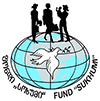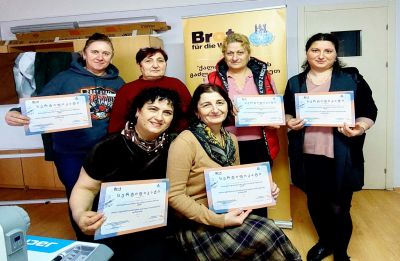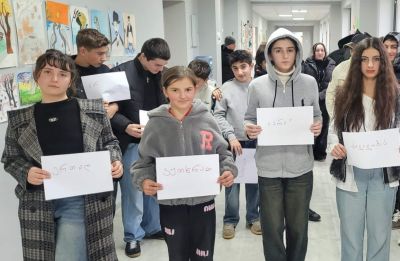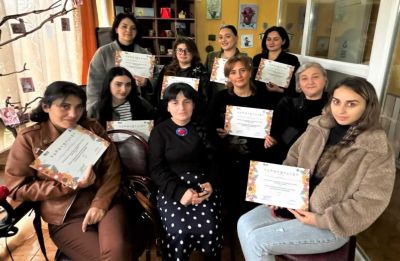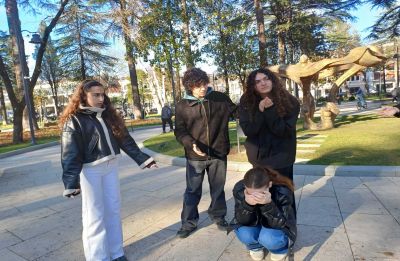Young Leaders' School (202)
Young Leaders’ School is working with young people to strengthen them and to form leadership skills. The work is carried out in 9 municipalities of Western Georgia - Kutaisi, Tskaltubo, Khoni, Terjla, Senaki, Poti, Khurcha / Koki (Zugdidi municipality), Lanchkhuti, Ozurgeti. These are information meetings about gender and domestic violence, workshops on conflictology for young people, meetings with boys, formation of a group of young trainers, trainings and various meetings with participation of young people.



- What the meaning of negotiations, how to negotiate, so that the matter does not reach a conflict, who is the facilitator - workshops on these issues were held with youth groups in Poti, Terjola and Zugdidi.
During the work the role games and exercises were used. Participants tried to conduct the negotiation process using imitated performances, to master the role and function of the mediator. They believe that the information received will give an opportunity, to effectively negotiate and manage conflicts in practice.





Informational meetings of youth clubs were held in the private school of Terjola and in public schools of Poti and the village Didinedzi (Zugdidi municipality).
Gender-based violence, forms and mechanisms of protection for violence prevention – this was the topic of the meetings.
After discussing the main topic, there were group games, showing the scenes of violence: domestic violence, violence at school, and conflicts between married couples. The teenagers worked independently, some of them participated for the first time. They clearly saw the forms of violence and their negative consequences. They also learned how to protect themselves from violence.








The work with the boys was summarized inKhoni, Poti and Kutaisi municipalities. The main goal of the final meetings is that the boys should prepare reports and show how wellthey understand the issues that were discussed. The openly presented and shared important information. The last part of the meetings was devoted to feedback and group exercises. The boys expressed the desire to share their knowledge to family members and friends.







“I do not recognize my students. I can safely say that this is the result of the work of the Fund “Sukhumi”, the teacher of civil education of one of the school noted.
All members of the Youth Clubs have changed. As they say, they like the topics, they become more active, and have a motivation for independent work.
The final meeting were held by young people themselves. They used all methods by which they worked at informational meetings: interactive, group exercises, role games, discussions, feedback.
All participants are actively involved in the work. This was the result of five months work in Tskaltubo, Ozurgeti, Lanchkhuti.



- Conflict analysis, negotiations, communication, equality, personal conflicts – the work on these topics was carried out with youth groups during five months.
At the end the final workshops were held. Young leaders held discussions. The meetings were attended by school teachers. According to the participants, it is possible to manage conflicts and regulate relations among adolescents through non-formal education, information.
The workshops were held in Tskaltubo, Ozurgeti and Lanchkhuti.







One cycle of the work with boys came to its end. The final meetings were held in Tskaltubo (October 16), Ozurgeti (October 17) and Lanchkhuti (October 19). Most of the meetings were devoted to reports made by the boys about violence and gender equality. They gave examples and shared their knowledge with the audience.
Part of the meeting was devoted to group exercises. Participants discussed how informal meetings should be held, in which grades they are more effective. According to the majority, it is advisable to work with pupils of the sixth and ninth grades, since the correct thinking is formed at this age.



Summarizing workshops on conflictology continues.
During the meeting in Khoni, the participants chose conflict analyzsis using the method of “conflict tree”, for the presentation. During the analysis, the real story was used, which made the discussion even more interesting.
In Poti, participants presented a group work: the importance of communication and negotiation during conflict management.
Young leaders from Kutaisi held presentations on the following topics: “Management of personal conflicts”, “Gender equality”, “Facilitation”. Involvement of participants was especially high.





Summarizing meetings with the boys, held in the municipalities of Senaki, Terjola and Poti, differed from other meetings. This time the participants themselves held presentations about violence and gender equality.
At the end of the meeting the trainer divided the boys into two groups. They had to answer the questions: whether they consider such work with adolescents necessary, whether they wish to conduct such meetings, which target audience would they choose and etc.
At the end, the boys themselves appreciated the work done and expressed a desire for new meetings.







Final meetings were held in Khoni, Poti, Kutaisi Youth Clubs.
It was a free choice of topics and young people worked during five months. They presented interesting presentations on violence, tolerance and a healthy lifestyle.
Group work and discussions were held. The participants actively discussed the reasons of violence among young people, the role of the family in a life of a teenager, stereotypes and indifference of society regarding the problem of violence.
Feedback from two participants is:
“I really like informal meetings that positively effect on personal development. I feel it on myself. ”
“I have become more active. These courses have defined my future profession.”






54 young people gathered at the final meetings in the Youth clubs of Terjola, Senaki, Ganmukhuri (Zugdidi municipality).
During the five-month work, specific topics were discussed: forms and types of gender violence, healthy lifestyle for the prevention of violence, tolerance, violence among adolescents. These were the topics for presentations chosen by the leaders. Active discussions took place. Young people showed their knowledge, awareness and experience - this is the result of the effective work of the youth clubs.
